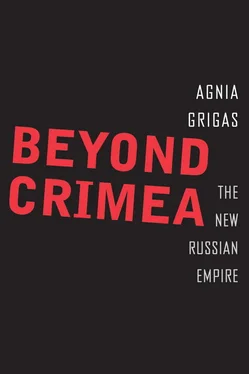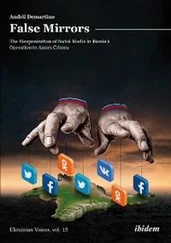Nonetheless, to create and maintain influence via information spread to the Russian compatriots, their Russian-language skills and those of other citizens of the former Soviet republics need to be maintained. Putin argued that “preserving a Russian-speaking territory” was “one of the priority issues” to be achieved via the compatriots. 101Accordingly, after its approval in December 2015, in 2006 the “Russian Language Federal Target Program 2006–2010” was launched. In 2011 it was updated to cover 2011–15. The purpose of the language program is twofold: first, it supports “the Russian language as the basis for the development of integration processes in the Commonwealth of Independent States”; second, it addresses “the language and cultural needs of compatriots living abroad.” 102The means to achieve these targets include organizing research and teaching, educational and cultural events, and provision of educational materials on Russian language, literature and culture, as well as remote Russian language teaching. On the other hand, the actual funds dedicated to these programs were minimal. In 2011–15, Russia devoted some $28 million (1.5 billion rubles) to the program of which 46 percent was invested to meet the “Satisfaction of Linguistic and Cultural Demands of Compatriots Abroad.” 103In contrast, the German Goethe-Institut has an approximate annual budget of $320 million, of which 40 percent goes to language education. 104This suggests that despite the rhetoric, Russia is not prepared to spend for purely cultural and linguistic support of the compatriots.
In March 2007, the softer and more humanitarian aspects of Russian foreign policy were conceptualized further in the “Russian Federation’s Foreign Policy Review.” It had been nearly a decade since compatriots were introduced into Russian foreign policy with the Foreign Policy Concept of 2000. The new review officially introduced the concept of the “humanitarian trend” of Russian foreign policy. Besides the defense of human rights, this included the protection of compatriots living abroad. The review was notable for several reasons. First, compatriots were conceptualized as important contributors to the formation of Russia’s “objective image” abroad. 105Second, to implement the “humanitarian trend” the review relied closely on “soft power” tools, which it noted were effective in producing favorable outcomes for the world’s great powers. 106However, Russia soon used compatriots for its military and territorial aims in the war with Georgia.
Just months before the start of war, Dmitry Medvedev was sworn in as president of Russia, a post he would hold until 2012, under the watchful eye and domineering hand of Prime Minister Putin. At just forty-two years of age, the former lecturer in civil and Roman law appeared to be a more youthful, liberal, and modern alternative to Putin. Yet, he lacked Putin’s strongman persona and eventually came to be regarded as little more than the prime minister’s shadow. Meanwhile, the summer of 2008 was a victorious one for the Medvedev-Putin duo. The so-called Five-Day War, the Russian invasion of Georgia, came and went. The world worried; the world grumbled; but the world also quickly forgot. Nonetheless, Russia clearly won this war, not only on the battlefield but in its permanent separation of South Ossetia and Abkhazia from Georgia. It was also a victory for Russia’s long-term strategy vis-à-vis its compatriots. As will be seen in Chapter 4, the Russian speakers and Russian citizens of South Ossetia and Abkhazia had become willing beneficiaries of Russia’s passports and thus its protection. Before Russian troops entered Georgia, Medvedev stated that “under the constitution and federal law… I must protect the life and dignity of Russian citizens wherever they are.” 107Later Medvedev repeated the same pretext vis-à-vis the South Ossetians, stating that “protecting the lives and dignity of our citizens, wherever they may be, is an unquestionable priority for our country” 108and “this is one of our foreign policy priorities.” 109Certainly Georgia’s first military move against the separatist territories made Russia’s call for protection of its citizens and compatriots seemingly more legitimate.
Subsequently, flushed with success in Georgia, in September 2008 Medvedev founded the Federal Agency for the Commonwealth of Independent States, Compatriots Living Abroad, and International Humanitarian Cooperation. This autonomous agency under the Russian Ministry of Foreign Affairs, headed by member of the Federation Council of the Russian Federal Assembly Konstantin Kosachyov, is responsible for supporting and developing relations between Russia and the CIS as well as other countries, including guiding compatriot issues. 110
In May 2009 “Russia’s National Security Strategy to 2020” was launched by presidential decree of Medvedev to supplement the “National Security Concept of the Russian Federation of 2000.” The new document reiterated and further reinforced as a long-term goal the “more effective defense of the rights and lawful interests of Russian citizens abroad.” 111Considering that Russia had just fought a war to defend the interests of its compatriots and citizens abroad, the rather ambiguous wording would seem to imply more than just diplomatic initiatives of compatriot support. And though the strategy did not reference compatriots directly, thanks to Moscow’s passportization efforts compatriots were often just one step shy of being citizens. 112The document also noted the importance of using “Russia’s cultural potential” to strengthen its national security: television and radio programs, internet sources, and cinematographic works. Such media initiatives would later become important tools of not only Russia’s soft power but also information warfare campaigns.
Contemporary Compatriot Policies and Laws
In July 2010 the fourth attempt was made to define Russian compatriots with an amendment to the 1999 “Federal Law on the State Policies of the Russian Federation with Regard to Compatriots Abroad.” The newest and final definition was equally if not more ambiguous. The amendment included the older 1999 definition of compatriots as those who were born in the same state (Russia and its predecessor the Soviet Union) and who share Russian cultural attributes. This was in direct contrast to the definition introduced in the 2001 Concept of Support to Compatriots that did not evoke the Soviet Union. For the first time, Russian citizens permanently living abroad were also included as compatriots. However, the new definition added another category of “individuals who live outside the Russian Federation and belong to the nations historically residing on the territory of Russian Federation and who also have made a free choice in favor of maintaining spiritual, cultural, and legal ties with Russian Federation.” 113Based on this definition, neither Russian ethnicity nor Russian language is necessary to be a Russian compatriot, nor is former Russian or Soviet citizenship. Any person who feels a spiritual or cultural connection with Russia and is descended from any of 185 current nationalities inhabiting the Russian Federation and of the many more nationalities that used to inhabit the Russian imperial territories could be called a compatriot.
Most crucially, the 2010 amendment both eliminated the necessity of legal self-identification by compatriots and at the same time required that a compatriot express his or her self-identification by actively participating in Russia’s cultural and political project. The earlier (never enacted) provision on compatriot identification cards was struck, thus eliminating compatriots as a legal category. 114Instead, the compatriot now had to engage and demonstrate: “civic or professional activity in preserving the Russian language and the native languages of the peoples of the Russian Federation, developing Russian culture abroad, strengthening friendly relations between the state in which the compatriot resides and the Russian Federation, supporting compatriot community associations, protecting the rights of compatriots, and maintaining spiritual and cultural connections with the Russian Federation in any other freely chosen way.” 115Therefore, by 2010 the definition of compatriots had shifted from something solely defined by one’s identity to something that must be also certifiable by membership in relevant organizations or by the person’s activities. Being a compatriot became a seemingly political or activist undertaking.
Читать дальше












